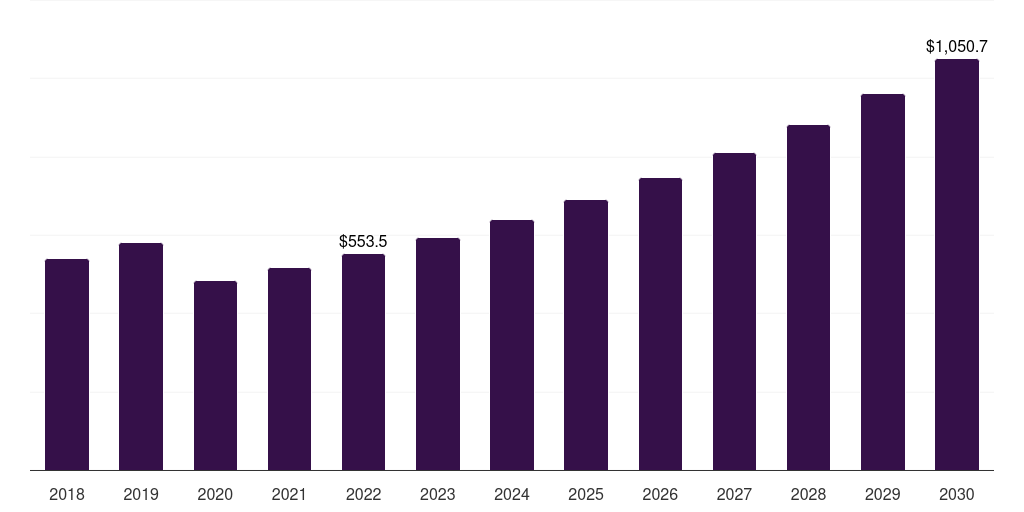Brazil Cycling Wear Market Size & Outlook, 2022-2030
Brazil cycling wear market, 2018-2030 (US$M)

Related Markets
Brazil cycling wear market highlights
- The Brazil cycling wear market generated a revenue of USD 553.5 million in 2022 and is expected to reach USD 1,050.7 million by 2030.
- The Brazil market is expected to grow at a CAGR of 8.3% from 2023 to 2030.
- In terms of segment, cycle wear apparel was the largest revenue generating product in 2022.
- Cycle wear accessories is the most lucrative product segment registering the fastest growth during the forecast period.
Cycling wear market data book summary
| Market revenue in 2022 | USD 553.5 million |
| Market revenue in 2030 | USD 1,050.7 million |
| Growth rate | 8.3% (CAGR from 2022 to 2030) |
| Largest segment | Cycle wear apparel |
| Fastest growing segment | Cycle wear accessories |
| Historical data | 2018 - 2021 |
| Base year | 2022 |
| Forecast period | 2023 - 2030 |
| Quantitative units | Revenue in USD million |
| Market segmentation | Cycle wear apparel, Cycle wear accessories, Cycle wear shoes |
| Key market players worldwide | Lumiere, Giro Sport, Castelli Cycling, Rapha, Champion System, United Apparel, ASSOS of Switzerland, Endura, Isadore, 2XU |
Other key industry trends
- In terms of revenue, Brazil accounted for 9.0% of the global cycling wear market in 2022.
- Country-wise, U.S. is expected to lead the global market in terms of revenue in 2030.
- In Latin America, Brazil cycling wear market is projected to lead the regional market in terms of revenue in 2030.
- Argentina is the fastest growing regional market in Latin America and is projected to reach USD 117.5 million by 2030.
Cycle wear apparel was the largest segment with a revenue share of 58.28% in 2022. Horizon Databook has segmented the Brazil cycling wear market based on cycle wear apparel, cycle wear accessories, cycle wear shoes covering the revenue growth of each sub-segment from 2018 to 2030.
Brazil has a long, proud tradition of urban cycling. From early on, the bicycle was embraced as a convenient, practical mode in Brazilian cities. The national modal share for bicycles in 2002 was around 2% and by 2012 that number had risen to 7%, again increasing by more than 10% in 2020.
In a number of smaller cities, the bicycle remains a primary form of transport: Ubatuba, Lorena, Rio Branco, Montes Claros, Aracaju, and Praia Grande. In Ubatuba and Lorena, both in the state of São Paulo, the modal share for bicycles is 55%, according to those municipalities. Rio Branco edges ahead with a record 65% of its citizens riding bicycles.
Among the big cities, Rio de Janeiro featured in The Copenhagenize Index 2013 Bicycle Friendly Cities, ranking as the 12th best city for bicycles in the world. The city has had cycle tracks since 1991.
Six Brazilian cities have bike-share programs. Compared to most cities around the world, Brazil has a rather unique approach to bike share. In both Rio de Janeiro and São Paulo, the programs were first launched in wealthier neighborhoods, with plans to expand later to areas with less prosperity. The idea was that if the middle and upper classes were seen to be the early adopters of shared bicycles, the lower classes would aspire to be like the prosperous, and embrace bike share as well.
No credit card required*
Horizon in a snapshot
- 30K+ Global Market Reports
- 120K+ Country Reports
- 1.2M+ Market Statistics
- 200K+ Company Profiles
- Industry insights and more
Cycling Wear Market Scope
Cycling Wear Market Companies
| Name | Profile | # Employees | HQ | Website |
|---|
Brazil cycling wear market size, by product, 2018-2030 (US$M)
Brazil Cycling Wear Market Outlook Share, 2022 & 2030 (US$M)
Related regional statistics
Sign up - it's easy, and free!
Sign up and get instant basic access to databook, upgrade
when ready, or enjoy our
free plan indefinitely.
Included in Horizon account
- 30K+ Global Market Reports
- 120K+ Country Reports
- 1.2M+ Market Statistics
- 200K+ Company Profiles
- Industry insights and more


